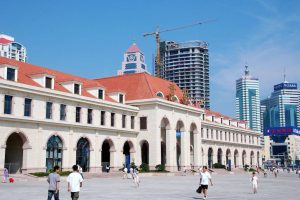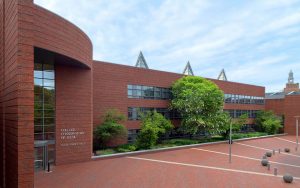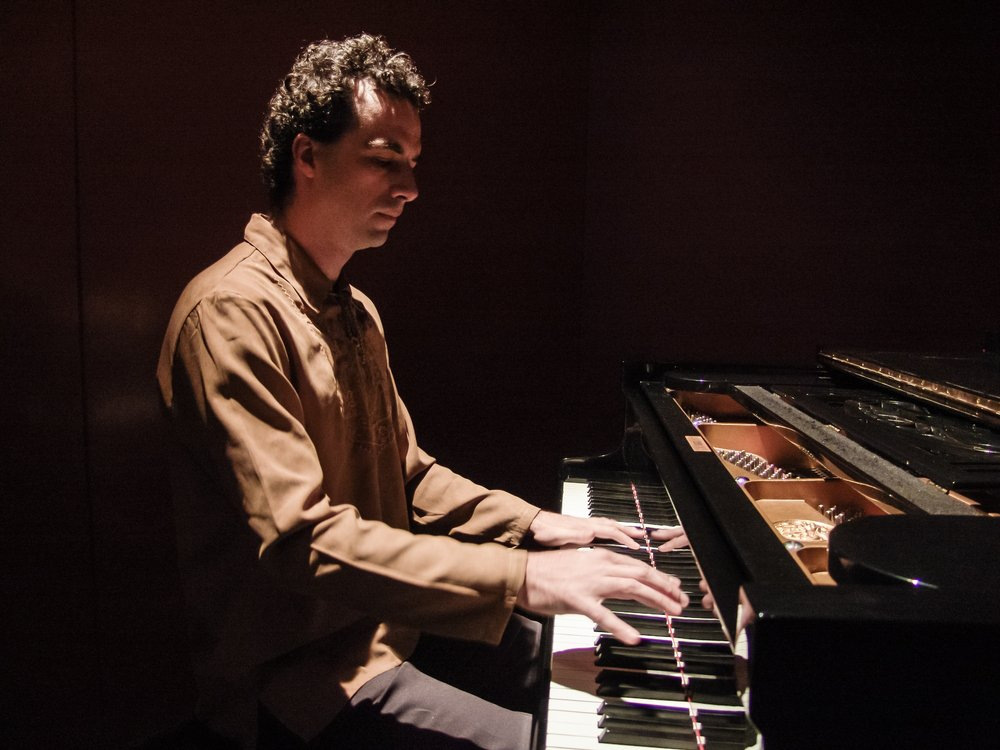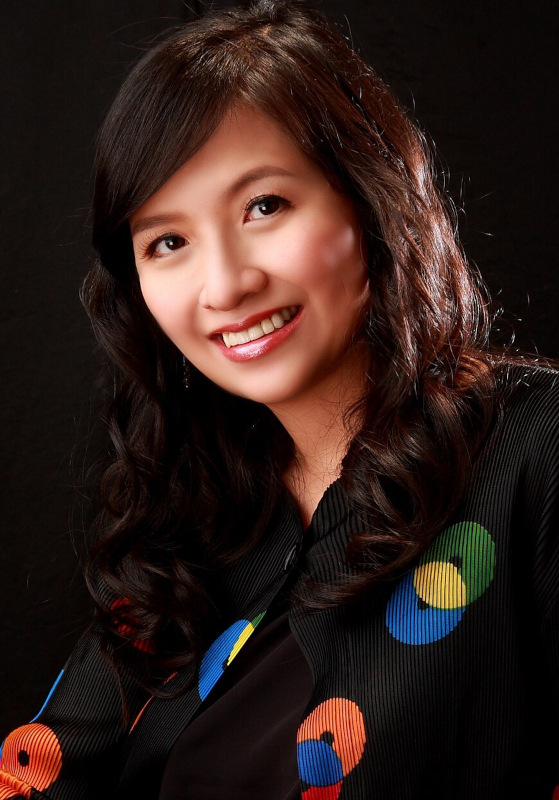
A Tale of Two Countries
Chinese and Taiwanese Heritage in Harmony
While nations rage, the violin and piano duo of Yang Liu and Olivia I-Hsuan Tsai are a shining example of people from conflicting worlds coming together to love and honor each other as individuals. This husband and wife team strives to spread love and tolerance between different cultures through their performances and through the Yang and Olivia Foundation.
A Tale of Two Countries
Yang and Olivia were both born in 1975, although in completely different worlds. Olivia was born in Taiwan, a democracy and staunch ally of the United States. Yang was born in mainland China. The communist nation had only recently ended its disastrous Cultural Revolution, which attempted to purge its society of all “decadent” Western influences, including classical music.

Yang was born in Qingdao, China, home of the famous Tsingtao beer. “When I was born, in some Chinese cities, Western music was still forbidden,” Yang said. “Some cities were more open. It depends. Some days you can play the violin for communist songs, and some days you cannot. It was a very sensitive thing.” “We lived right next to a metal cutting factory,” Yang said. “You can imagine how loud it gets. We lived right next to it. So all day long, you hear the metal cutting, from 8 a.m. to 6 p.m. that’s all you hear is metal cutting. You would consider it a ghetto area. A very bad place.
A Neighbor’s Secret
As a very young boy, in the midst of the noise and grime and misery, Yang was touched by the sound of the violin. “We had a neighbor who secretly played violin,” Yang said. “She was 20 or so. She loved the violin, and she stuffed her windows and doors with thick blankets because she didn’t want anyone to hear it so that it wouldn’t cause her serious trouble. It was almost half a block away, but somehow I could hear it as it went under the window, and I just fell in love with that sound. Yang asked his parents what that sound was, but they tried to shush him and told him not to talk about it. But he was persistent.
“So eventually they told me it’s called a violin, a Western instrument that’s a wooden box,” Yang said. “There was no music background in my family, so that’s all they knew. I cried my guts out for about three months and said I wanted a violin for one of my toys. They wouldn’t get me one because it was still considered something that could get you in trouble. It was my grandma who finally said, ‘For Christ’s sake, get this boy a violin.’”
And they did. Yang says that for him violin was a calling. He would eventually study at the Beijing Central Conservatory and make his way to the United States to study with renowned violin instructor Dorothy DeLay at the University of Cincinnati.
In Her Footsteps
In contrast to Yang’s bleak and oppressive upbringing, Olivia grew up in Taiwan in a nurturing musical environment. “The way I started in music had everything to do with my sister,” Olivia said. “She’s five years older than I am, and according to my parents, my sister showed an early extreme musical talent. When she was a toddler, she was given a toy piano and was able to duplicate and repeat the tunes she heard on the toy piano. So she started music instruction, and when I came along and saw my sister performing on the stage, I told my mom I want to be like my sister.”
Olivia says that she was six years old when she began piano lessons. She says that Taiwan had an experimental music program where, if students passed an audition, they could begin professional, conservatory-level training in elementary school. The program continued through middle school and high school. “My sister and I kept passing auditions, and we got admitted into the special program,” Olivia said. “That’s how we started on this journey.” “During our school years, we knew each other, but we didn’t like each other,” Olivia said. Their relationship began after both had completed their studies when they performed together at the Aspen Music Festival. Their love for each other grew, and they married. They now have two boys, ages 11 and 13.
Training in America

Olivia would eventually receive her undergraduate and two master’s degrees, including a master’s in piano performance, at the University of Indiana in Bloomington. She then received her doctorate at the University of Cincinnati College-Conservatory of Music. It was there that she met Yang.
Adopting a New Country
Yang and Olivia both say that they feel at home in America. After his studies at the Beijing Conservatory, Yang spent time in Germany, which he says was a very different experience. “I basically had a miserable time in Germany,” Yang said. “I found it culturally unaccepting and difficult to find my place. But in America, right away, it was very relaxed and easy. There’s no problem being accepted. I really adored the attitude of American people. No one treated you as a foreigner. No one said, ‘I’m an American, and you are not.’”
A Post-Cultural Revolution Explosion
Since the end of the Cultural Revolution, the number of brilliant Chinese classical musicians who have come to the West has exploded. Asians have a strong affinity for Western classical music, but for some reason, Westerners don’t share that affinity for Asian music. Yang has thought deeply about this and thinks he knows why. “In Chinese music, beauty is a very narrow path,” Yang said “Chinese music has a pentatonic scale, five notes. However you combine these five notes, you will never get a dissonant, inharmonious harmony. But we don’t only have peace in our lives. So there, it’s already limiting its exploration of humanity. But Western music is about exploring, exploring, exploring. Long story short, Western art is an exploration of humanity in its most honest, truthful state. It is pursuing the truth of humanity versus Chinese art which pursues the ivory tower, the narrow path.”
Diversity and Discovery on Stage
Yang and Olivia have deep respect for both Eastern and Western music and always try to include music from their heritage as a part of their concert programs. For example, their Guarneri Hall concert will include music by a Taiwanese-American composer and an arrangement of a Chinese folk song. However, the concert will begin and end with a pair of Western composers, Wolfgang Amadeus Mozart and Henryk Wieniawski. The program starts off with Mozart’s Violin Sonata in E-minor, K. 304. “This is a sonata that describes the devastation in Mozart’s life, the dark side that he experiences rather than pure innocence and beauty,” Yang said.
Admired from Afar

The Mozart will be followed by Cantiga, by Brazilian composer Dmitri Cervo. Yang met Cervo just a few months ago, in May, while giving a concert tour in Brazil. “The interesting thing is we heard about each other for quite a few years and admired each other’s work,” Yang said. “I had a chance to go to one of his concerts, and he had a chance to come to my concert during the same three days I was in Brazil. Right away, we hit it off, and shortly after, he sent this beautiful small piece of songs that he composed for us, and we’re bringing this to the concert at Guarneri Hall.” There’s also an American work on the program, Out In The Storm by Kevin Wilt. “It has so many fascinating musical elements,” Olivia said. “We felt we have to bring this piece to the stage. We also realized that a lot of contemporary composers love to have their pieces performed in different places.” To honor Olivia’s heritage, the duo will perform Gín-Á Koa by the contemporary Taiwanese-American composer Chihchun Chi-sun Lee.
A Darker Chapter

But a darker chapter of Chinese history will be highlighted in Celebration of the Bumper Harvest, a northern Chinese worker’s song arranged for piano and violin in 1958. The song became an anthem of the Cultural Revolution, which started just a few years later in 1966. “Here’s my honest view, I didn’t want to put it on the program,” Yang said. “I didn’t have any good memory about this song. From 1959 to 1962, there was a famine in China. According to a conservative estimate by the government, 20 million people died of starvation. But this is when they sang this song to celebrate the harvest. This is the happiness that’s ordered from above. You are facing famine and death, but you must be happy and celebrate the communist glory and believe in it.”
The concert will conclude with Wieniawski’s Capricio-Waltz. “That is something to lighten up everything and be a great ending because we have a program that is really rich in content,” Yang said. “We want to send everyone off in a good mood. It’s fun. In the end, I think you need to look at life with humor. Life is hard.”
A Foundation of Tolerance

It is obvious that Yang and Olivia both deeply love America, but they are concerned by recent events. They both see troubling parallels between current politics and the Cultural Revolution. “That mentality was not just in 1958 in China; it is in today’s world everywhere,” Yang said. “Radical religion or radical political views reflect this mentality. I think both sides in America, left and right, are so polarized now that they hold their political beliefs as a religion. I see how divided the American people are by their politics. It doesn’t matter whatever devastation your political opinion costs people; mine is better than yours: my belief is an absolute right. This is the same mentality as the Cultural Revolution.”
In an effort to encourage tolerance for diverse ethnicities, backgrounds and beliefs, Yang and Olivia have founded the Yang and Olivia Foundation. The foundation was originally started as an international cultural exchange. “Pretty soon after we founded it, there was tension between the United States and China, and then there was the pandemic, and there was also the interest in diversity and inclusion,” Olivia said. “So now we’re focusing on local outreach in libraries and schools. We’ll be talking about the music of different heritages, to bring the flavor of all kinds of music and show how they influence each other. We want to bring it to venues where people probably don’t usually have a chance to hear this.” Yang and Olivia created their foundation as a way of thanking America for its welcoming attitude when they first came to this country. They want others to experience their love of diversity and differences and encourage tolerance. “We realize how blessed we were that we felt included and that our ethnicity or upbringing or skin color was never a problem for us,” Olivia said. “We felt that America is very welcoming for all kinds of differences. We are glad to be part of it.”
Learn more about Yang and Olivia and their foundation at yangandolivia.com. Be sure to catch Yang and Olivia’s concert at Guarneri Hall on October 3, 2022.

